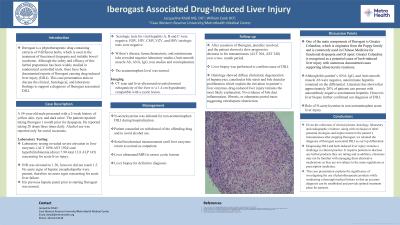Sunday Poster Session
Category: Liver
P1127 - Iberogast Associated Drug-Induced Liver Injury
Sunday, October 22, 2023
3:30 PM - 7:00 PM PT
Location: Exhibit Hall

Has Audio

Jacqueline Khalil, DO, MS
Case Western Reserve University/Metro Health
Cleveland, OH
Presenting Author(s)
Jacqueline Khalil, DO, MS, William C. Cook, DO
Case Western Reserve University/Metro Health, Cleveland, OH
Introduction: Iberogast is a phytotherapeutic drug containing extracts of 9 different herbs, which is used in the treatment of functional dyspepsia and irritable bowel syndrome. Although the safety and efficacy of this herbal preparation has been widely studied in randomized controlled trials, there have been documented reports of Iberogast causing drug induced liver injury (DILI). This case presentation aims to discuss the clinical and laboratory findings to support a diagnosis of Iberogast associated DILI.
Case Description/Methods: A 54-year-old male presented with a 2-week history of yellow skin, eyes, and dark urine. The patient reported taking Iberogast 1 month prior for dyspepsia. He reported taking 20 drops three times daily. Alcohol use was reported only for social occasions. Labs revealed severe elevation in liver enzymes (ALT 1898 AST 1924) and hyperbilirubinemia (direct 7.90 total 13.8 ALP 145) concerning for hepatocellular liver injury. INR was elevated, however did not reach 1.5. No acute signs of hepatic encephalopathy were present. His previous hepatic panel prior to starting Iberogast was normal. Serologic tests for viral hepatitis A, B and C were negative. EBV, HIV, CMV,VZV, and HSV serologic tests were negative. Wilson’s disease and hemochromatosis were ruled out as well as autoimmune etiologies of hepatitis based on negative laboratory studies. The acetaminophen level was normal. N-acetylcysteine was initiated for non-acetaminophen DILI. CT scan and RUQ ultrasound showed normal echogenicity of the liver. After cessation of Iberogast, the patient showed a slow progressive decrease in his transaminases. Given the collection of clinical, laboratory and radiographic evidence along with exclusion of other etiologies and improvement in transaminases after stopping the medication, our patient was diagnosed with Iberogast associated DILI. Liver biopsy is planned.
Discussion: Diagnosing DILI and herb-induced liver injury remains a challenge in clinical practice. It requires patients to disclose any herbal products they are taking and in addition, clinicians may not be familiar with managing these alternative medications. After exclusion of other potential etiologies of possible acute liver injury, we retained the diagnosis of Iberogast associated DILI. This case presentation explains the significance of investigating the use of phytotherapeutic products while conducting a thorough medical history so that an accurate diagnosis can be established and provide optimal treatment plans for patients.
Disclosures:
Jacqueline Khalil, DO, MS, William C. Cook, DO. P1127 - Iberogast Associated Drug-Induced Liver Injury, ACG 2023 Annual Scientific Meeting Abstracts. Vancouver, BC, Canada: American College of Gastroenterology.
Case Western Reserve University/Metro Health, Cleveland, OH
Introduction: Iberogast is a phytotherapeutic drug containing extracts of 9 different herbs, which is used in the treatment of functional dyspepsia and irritable bowel syndrome. Although the safety and efficacy of this herbal preparation has been widely studied in randomized controlled trials, there have been documented reports of Iberogast causing drug induced liver injury (DILI). This case presentation aims to discuss the clinical and laboratory findings to support a diagnosis of Iberogast associated DILI.
Case Description/Methods: A 54-year-old male presented with a 2-week history of yellow skin, eyes, and dark urine. The patient reported taking Iberogast 1 month prior for dyspepsia. He reported taking 20 drops three times daily. Alcohol use was reported only for social occasions. Labs revealed severe elevation in liver enzymes (ALT 1898 AST 1924) and hyperbilirubinemia (direct 7.90 total 13.8 ALP 145) concerning for hepatocellular liver injury. INR was elevated, however did not reach 1.5. No acute signs of hepatic encephalopathy were present. His previous hepatic panel prior to starting Iberogast was normal. Serologic tests for viral hepatitis A, B and C were negative. EBV, HIV, CMV,VZV, and HSV serologic tests were negative. Wilson’s disease and hemochromatosis were ruled out as well as autoimmune etiologies of hepatitis based on negative laboratory studies. The acetaminophen level was normal. N-acetylcysteine was initiated for non-acetaminophen DILI. CT scan and RUQ ultrasound showed normal echogenicity of the liver. After cessation of Iberogast, the patient showed a slow progressive decrease in his transaminases. Given the collection of clinical, laboratory and radiographic evidence along with exclusion of other etiologies and improvement in transaminases after stopping the medication, our patient was diagnosed with Iberogast associated DILI. Liver biopsy is planned.
Discussion: Diagnosing DILI and herb-induced liver injury remains a challenge in clinical practice. It requires patients to disclose any herbal products they are taking and in addition, clinicians may not be familiar with managing these alternative medications. After exclusion of other potential etiologies of possible acute liver injury, we retained the diagnosis of Iberogast associated DILI. This case presentation explains the significance of investigating the use of phytotherapeutic products while conducting a thorough medical history so that an accurate diagnosis can be established and provide optimal treatment plans for patients.
Disclosures:
Jacqueline Khalil indicated no relevant financial relationships.
William Cook indicated no relevant financial relationships.
Jacqueline Khalil, DO, MS, William C. Cook, DO. P1127 - Iberogast Associated Drug-Induced Liver Injury, ACG 2023 Annual Scientific Meeting Abstracts. Vancouver, BC, Canada: American College of Gastroenterology.
